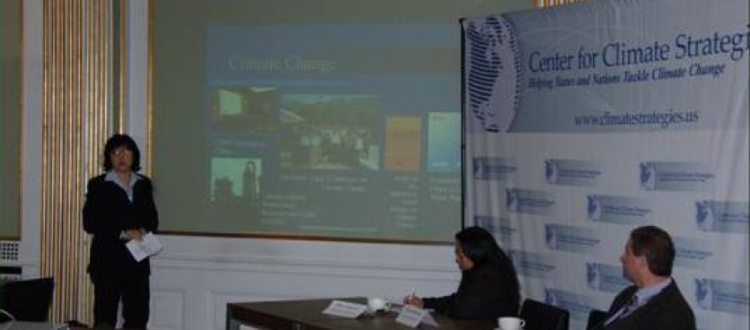GEI Promotes Open Sharing and Collaboration at COP 15
COPENHAGEN (Dec. 14, 2009) – Global Environmental Institute actively shared China’s position on climate change and advocated for cooperative and innovative methodologies at the UNFCC Conference of the Parties 15 (COP15) in Copenhagen, Denmark. GEI demonstrated its creative and vanguard method through engaging participants in discussions on intellectual property as it relates to low-carbon development as well as means for US-China collaboration on climate change.

Mme Jin (pictured at right) delivers a speech. – GEI 2009
Intellectual Property and Environment Solutions
On December 12, GEI hosted its own side-event entitled “Beyond the Deadlock: Rethinking Perspectives and Actions on Technology Diffusion.” The event offered suggestions on how to overcome the current impasse in the global response to climate change.
“Up to now, problems in technology transfer and intellectual property have created an impasse in the global climate negotiations under the UNFCCC framework. We want the people who attend our side event to rethink with us this question: how we can break this deadlock and substantially reduce emissions, a problem which we can no longer wait to solve!” – Mme JIN Jiaman
The event highlighted the barriers to technology transfer, including IP, insufficient funding and a narrow focus high investment, high-tech R&D technology solutions to the exclusion of the on-the-ground, short-term solutions. It also pointed out a need to shift emphasis from the targets themselves to the actual process by which the targets could be achieved. GEI called for a rethinking of these issues and a new approach for overcoming these obstacles.
The event was framed with three key questions: what technology should be diffused, how to accelerate diffusion, and where to diffuse?
GEI stressed that the concept of technology diffusion should include not only include traditional technology transfer from the developed to the developing world, but also the flow of technology between developing nations and at the community level. To demonstrate this thinking, GEI proceeded gave case-based studies and expert commentary on topics of rural energy, bridging technology and finance, and climate action planning. This included distributed household biogas, biochar, LEDs, financing for energy efficiency, joint production, and national and sub-national climate action planning.
Speakers at the side event included Ms. Jin Jiaman, GEI Program Officers, and Ms. Amal-Lee Amin, GEI Board Member, and GEI’s strategic partners, including Dr. Wasantha Piyadasa of the Ministry of Livestock Development in Sri Lanka, Professor Wang Yanjia, an energy expert at Tsinghua University, and Thomas Peterson, CEO and President of the US-based Center for Climate Strategies.
US-China Collaboration for Climate Work

GEI & CCS co-host COP 15 side event” “International Scale-up: U.S. Collaboration with China.” – GEI 2009
During the event, Ms. Jin Jiaman, Executive Director of GEI, and Mr. Tom Peterson, CEO and President of CCS, compared the China and US systems for structuring and implementing climate policies, reviewed the status quo of climate efforts of the two nations, and explored the opportunities and challenges of China’s adaptation and domestication of the CCS model. Attendees of the side event included experts from Ceres, China’s Sun-Yat Sen University and companies focusing on black carbon. The experts emphasized the importance of further cooperation on climate action planning and capacity building between China and the US.
This event was held in the style of a town-hall forum, which allowed greater opportunity for in-depth discussion and interactivity with the audience. It helped the audience better understand the process of Chinese climate policy making, and the possibilities for cooperation on climate change planning between the two countries.

